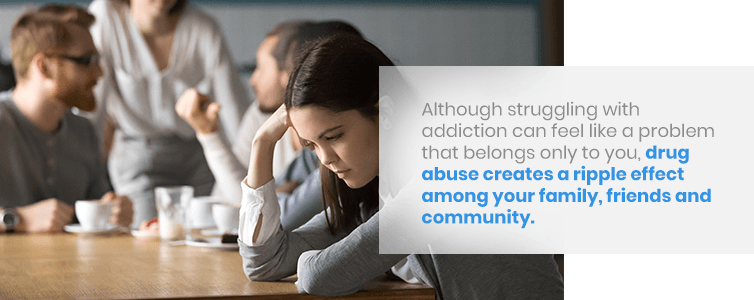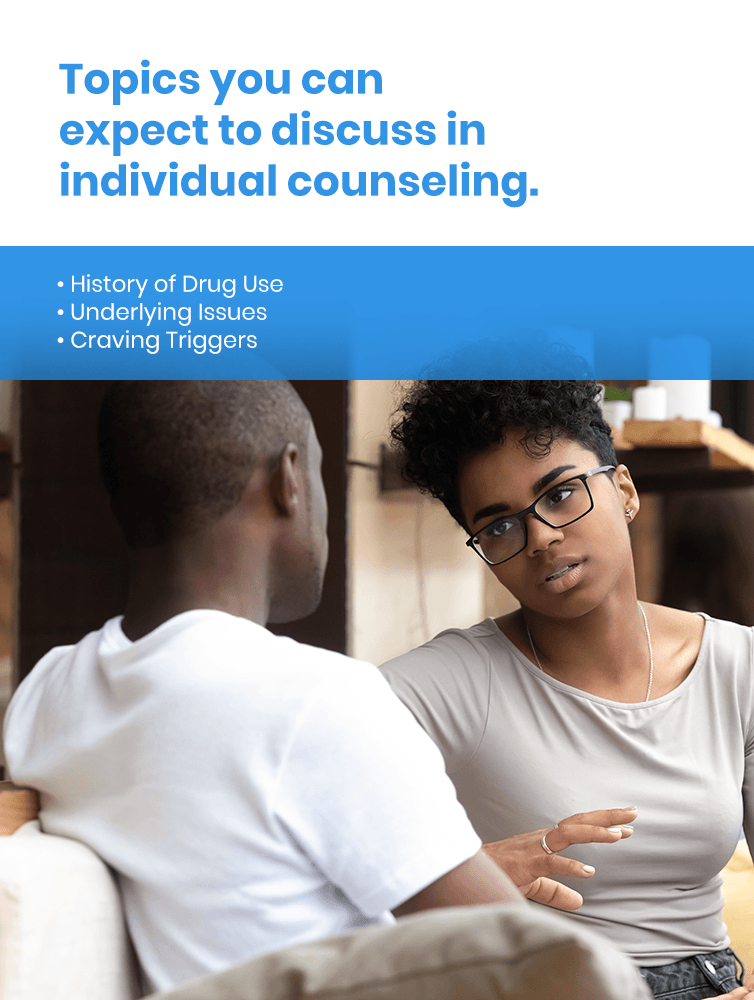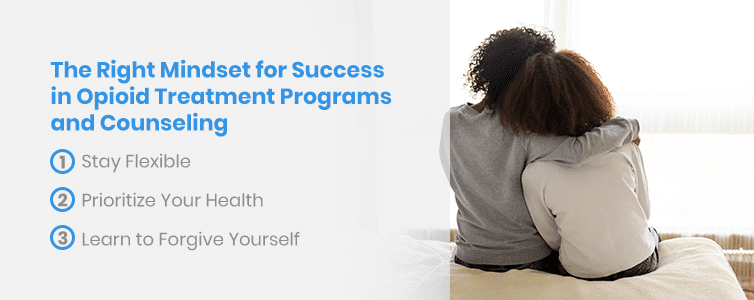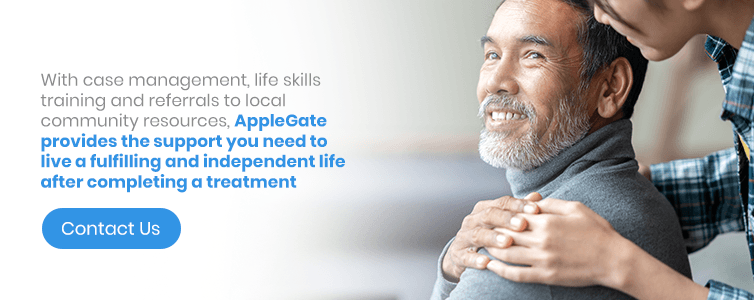Of the many treatment options available for opioid addiction, including medication-assisted treatment (MAT), almost all of them feature counseling in some form or another. The idea of counseling can be off-putting for a lot of people, and you may not see why it’s so valuable. Individual counseling for opioid addiction can seem like a painful, awkward proposition at first, but it’s highly effective and supports the medical treatment you need. The medication in MAT provides relief from the relapse-inducing withdrawal symptoms that come with trying to stop using opioids, however, the real work of recovery happens in counseling. It’s critical to understand just how one-to-one substance use counseling will help you work toward sustained sobriety.
Why Enter Counseling With Outpatient Addiction Treatment?
Outpatient treatment can save lives without requiring people to undergo the typical 30- to 90-day inpatient rehab. Medication-assisted treatment programs allow you to pursue recovery on your schedule. In this type of treatment program, you regularly visit an office or clinic to receive a medication that helps alleviate the symptoms and cravings associated with opioid withdrawal. The three medications currently available in various outpatient settings include buprenorphine (Suboxone®), Sublocade™, methadone and naltrexone (Vivitrol®)*.
The medication you receive helps you stay more level-headed as you eliminate opioids of abuse from your system naturally, so you don’t have to go through a disruptive and expensive medical detoxification process. Treatment allows you to keep working or going to school with minimal interruption, and gives you the chance to work on recovery without the pain of withdrawal.
The medication sets the stage for counseling in treatment. Participating in counseling helps you investigate the root causes of addiction and gives you the tools you need to build a sound foundation for sobriety. The new skills you learn will allow you to navigate stress and enjoy life with new, healthier coping skills. The combination of medication with counseling is so effective that it has become the gold standard for treatment of opioid use disorder.
How Does Counseling Help With Addiction?
Counseling is an integral part of treatment and recovery because it addresses multiple issues most people have no idea how to tackle on their own, or may not even know they have. These three areas are often the focus of counseling for addiction.
1. Find the Root Cause
Addiction doesn’t develop on its own, and it can happen to anyone regardless of demographic. Every person struggling with addiction is dealing with multiple factors that may or may not be apparent, and counseling helps draw out those factors for closer examination. Opioid addiction is particularly challenging because so many people begin by abusing prescribed medications taken for a valid reason. Although taking more of a medication due to physical pain may seem straightforward, there are often underlying elements a person may miss or ignore.
If a person with back pain begins taking more than their doctor has prescribed, it’s easy to dismiss this behavior as a simple response to pain. However, counseling may reveal more complex rationale behind the physical elements of addiction. Maybe the psychological effects of the prescribed painkillers dull anxiety about medical bills, or help repress the symptoms of depression from being out of work. Working one-on-one with a qualified counselor can open up doors you didn’t even know existed, helping you better understand yourself and your addiction.

2. Mend Relationships
Although struggling with addiction can feel like a problem that belongs only to you, drug abuse creates a ripple effect among your family, friends and community. The longer drug abuse continues, the more likely a person is to have damaged multiple relationships with people they care about through the pursuit of substances. People under the influence of addiction say and do things they would never do sober, and it can be challenging to reach out over the bridges burned.
Individual counseling provides a safe space to examine the effect of addiction on relationships without judgment. A counselor can provide helpful perspective, as well as strategies you can use to begin healing your connections to people you care about.
3. Learn Coping Skills
Abusing opioids and getting high are signs that you’re not happy or fulfilled in your natural, sober state. Abusing drugs may be a reaction to stress, anxiety or depression. Stress is an inevitable part of life, and it is often a significant trigger for drug cravings. Rather than processing the emotions occurring alongside the stress, someone may opt to “switch off” the feeling by getting high.
Counseling is crucial for learning how to deal with stress and other negative emotions that drive substance abuse. If you can recognize your emotions, you can evaluate and manage them much more effectively. Self-regulation is a central goal in individual counseling. Once you get into practice, you’ll be able to take yourself out of risky situations and find ways to alter your reactions to stress — both essential skills in maintaining sobriety.
What Is the Best Type of Counseling for Addiction?
Opioid addiction counseling isn’t one-size-fits-all. A counselor can employ several techniques during individual counseling, some of them better-known than others. Biofeedback, for instance, uses electrical sensors to track your biological signs. You will then get exposed to input like pulsating sounds or flashing lights to evoke sensations of stress similar to those felt during a strong craving. The idea is to help the patient understand involuntary functions and gain some control over them.
For the most part, individual counseling involves a combination of techniques taken from cognitive behavioral therapy (CBT). The goal of CBT is to show the patient that many of the harmful thoughts and feelings driving compulsive drug use are illogical and irrational. To effect change, patients learn tools that help them:
- Recognize distorted thinking and evaluate it more objectively.
- Gain a clearer understanding of motivations and behaviors in others.
- Use problem-solving to navigate difficult situations.
- Develop more confidence in their abilities.
CBT is the most common form of counseling, and it has multiple derivatives you may encounter. Dialectical behavioral therapy (DBT) is a type of CBT originally developed for people with borderline personality disorder, but it’s been helpful in cases of substance abuse as well. DBT helps with addiction by focusing on four central strategies.
- Mindfulness: Focusing on living in the present moment.
- Distress tolerance: Accepting yourself in the current situation, evaluating the pros and cons and employing strategies to regulate stress.
- Interpersonal effectiveness: Being appropriately assertive, maintaining boundaries and keeping relationships healthy.
- Emotional regulation: Recognizing negative emotions and coping with them to reduce emotional vulnerability.
It’s essential to discuss potential techniques with a counselor, especially if you have a specific format you would like to try. Not all forms of therapy work well for everyone. Patients who are highly sensitive to external stimuli might find biofeedback overwhelming, for example. Thankfully, the range of available techniques in individual counseling ensures there is a type that’s right for you.
How Does One-to-One Counseling Work?
It’s natural to be nervous about attending a counseling session for the first time, and even several sessions after that. You’re meeting a stranger who will be asking about details that may be uncomfortable to share. The basis of opioid addiction counseling is an exploration of your thoughts, emotions and behaviors, which your counselor will facilitate through conversations. Here are some of the topics you can expect to discuss in individual counseling.

1. History of Drug Use
You’re attending counseling as a means of treating an addiction, so it stands to reason that your counselor will want to find out everything there is to know about your relationship to drugs. You will need to tell them when and how you first used opioids, including if it was prescribed or if recreational, why you took them. Uncovering your motivation for first drug use is crucial in determining your relationship to the substance.
The first appointment is usually about gathering the basic facts and establishing a baseline. Further appointments may include more personal questions that may be difficult to answer, such as, “Have you ever physically or emotionally hurt a loved one while on drugs?” Fortunately, part of the counseling process is building trust so that you can feel comfortable talking to your counselor about these sensitive topics. It’s essential to answer these questions with complete truthfulness, even if the answers are a source of shame or guilt. Recovery only lasts on a foundation of openness and honesty.
2. Underlying Issues
Many people who turn to drug use do so because they are unable to cope with the symptoms of an underlying condition. It’s common for substance abuse to occur alongside depression or anxiety, for example. Among adults with a substance use disorder, nearly 38% also have some form of mental illness. Many people struggling with addiction don’t even realize they meet the criteria for a diagnosis of a mental illness, and don’t understand how the co-occurring condition worsens their substance abuse.
3. Craving Triggers
It can be challenging or embarrassing to discuss the inner processes that make you want to use drugs. It’s often hard to identify triggers even when you’re entirely ready to talk about them. Your counselor will help you see patterns of craving triggers by asking about times when you felt compelled to abuse drugs, which can dredge up emotionally charged memories. Counseling will better prepare you to deal with triggers during recovery.
The Right Mindset for Success in Opioid Treatment Programs and Counseling
Individual counseling for opioid addiction can be highly effective as long as you are in the right frame of mind and taking the right approach. Remember the following tips to get the most out of medication-assisted treatment and one-on-one counseling.

1. Stay Flexible
Openness and flexibility are crucial to achieving sustained recovery through medication and counseling. Addiction can only thrive when a person builds up walls to keep others out, and breaking down those walls takes courage as well as commitment. To reduce emotional volatility and change your reactions to situations that trigger cravings, you’ll need to approach your emotions from entirely new angles.
Your counselor will ask you to think in new ways and apply new skills, and a conscious attitude of flexible openness will help you get as much value as possible from these experiences.
2. Prioritize Your Health
Addiction takes a heavy toll on the body as well as the mind. Taking opioids day in and day out leads to long-term damage in multiple bodily systems, including the central nervous system, as well as the immune and cardiovascular systems. Fatigue and poor nutrition are also common among those struggling with opioid addiction.
To derive the most value from MAT and counseling, you’ll need to set aside time to take care of your physical well-being. Balanced nutrition is one of the greatest gifts you can give yourself in recovery, and adding in some brain-boosting nutrients like omega-3 fatty acids can have you feeling better than you have in months or years.
Exercise is another key element to physical health that can also have great benefits for the mind. People in recovery frequently wrestle with depression, which exercise helps. Getting enough sleep is also essential to the healing process, so be sure you’re getting a full eight hours whenever possible. Addiction may result in disordered sleep, so consider enlisting the help of your counselor in addressing and improving any sleep-related problems.
3. Learn to Forgive Yourself
You are in an addiction treatment program because substance abuse has changed you for the worse. Most people who struggle with addiction lose friends and family, and have done things they wish they hadn’t. It’s normal to have guilt around actions driven by substance abuse, but becoming consumed by that guilt reduces your ability to participate in treatment and embrace the healing you’re looking for.
Part of the process is learning to accept the mistakes you’ve made and the harm you’ve caused, while committing to becoming a better person. Forgive yourself, but don’t forget the impact addiction has had on you and those around you.
Remember, your counselor is there to support you in your decision to eliminate substance abuse from your life. While the counselor may ask you to perform challenging introspection and make difficult changes in your life, they are always in your corner working with you and never against you. Once you establish trust with your counselor, you’ll start seeing how effective counseling in MAT can be.
Addiction Treatment at AppleGate Recovery
The first step on the road to recovery is admitting your struggle with addiction and finding the right help to beat it. AppleGate Recovery can help with buprenorphine-based MAT and counseling for opioid addiction on a group or individual basis. Many people find that a combination of counseling formats is effective. AppleGate provides ongoing medical and clinical supervision to ensure you’re staying as healthy as possible in recovery, and even provides smoking cessation and lab services in select locations.

With case management, life skills training and referrals to local community resources, AppleGate provides the support you need to live a fulfilling and independent life after completing a treatment program. Individualized care addresses your specific needs, setting you up with the best chances for success in recovery.
If you or someone you care about is interested in breaking free from opioid addiction, it’s time to get help. Call AppleGate Recovery at 888-488-5337 or contact us online with your addiction and treatment questions. Working together, we can bring recovery within reach.
*Currently AppleGate Recovery offers buprenorphine and buprenorphine compounds such as Suboxone® in all treatment locations.
